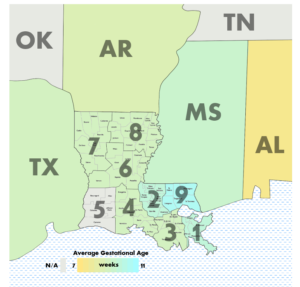
Ending My Time with NOAF By Christina Cimini
I’m quickly approaching the end of my college career and, with it, the end of my time with the New Orleans Abortion Fund (NOAF). I am so incredibly grateful to have had this experience and to have been able to meet all of the compassionate, dedicated people who work at NOAF and who partake in the internship program with me. I’d particularly like to give a special shoutout to my supervisor, Elizabeth Gelvin, who has been so supportive and crucial to my growth while at NOAF.
Through my work at NOAF, I have been able to gain an amazing new perspective on the lives of those who receive abortions as well as gain valuable skills that I can carry with me into the future. In particular, working at NOAF allowed me to identify my love for data analysis and graphic design, and I was able to make a number of helpful infographics and data reports that have been greatly informative to those at NOAF and beyond. Looking to the future, I am considering attending graduate school to get my Master of Social Work and am awaiting a response from Columbia University. Regardless, I definitely interested in continuing my involvement in the world of data science, and I would love to learn a programming language such as R or Stata over the summer.
This has been a really hard year in the world of reproductive rights. States are constantly putting abortion under attack, and the pandemic has made it even more difficult than usual for people to receive abortions. As such, I feel humbled and honored to have been able to help abortion remain accessible (or at least relatively accessible), and I have learned a lot about abortion and the people who receive them.
Notably, I read The Turnaway Study by Diana Greene Foster at the suggestion of Dr. Daniel, and I gained a lot of incredible information about why people get abortions, what the impact of those abortions are, and what the consequences are of not being able to receive a wanted abortion. Perhaps most memorably, it was found that the vast majority of women do not regret receiving an abortion and that receiving as opposed to being denied an abortion leads to a host of positive financial and health outcomes. This study simply reaffirmed my commitment to abortion access and reproductive health, and I hope it will be work I will be able to continue to engage with even after my time with NOAF.
Overall, although I am sad to be leaving NOAF and Tulane, I am excited (albeit a bit scared) to see what the future will hold for me. However, I am forever thankful for the connections I have made, the skills I have learned, and the knowledge that I have gained from both Newcomb’s Reproductive Rights and Reproductive Health Internships Program and from the New Orleans Abortion Fund.
